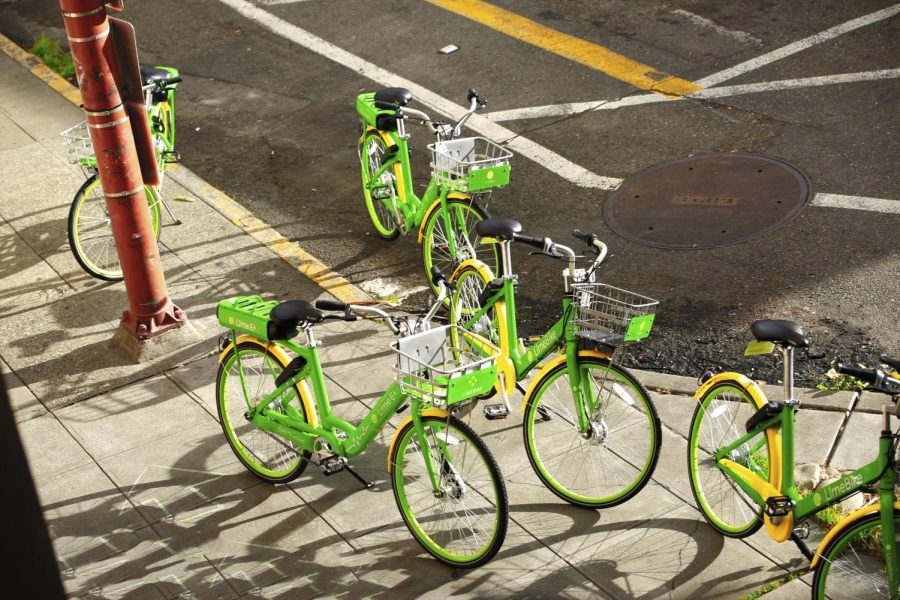A Wheelie Interesting Situation
LINING THE STREETS In Seattle, dockless Lime bikes are clustered at street corners. Now found in 100 cities in the United States and Europe, these bikes and e-scooters have been gaining substantial popularity. The company is now estimated to be worth $1.1 billion.
September 28, 2018
If you have gone to Seattle recently, you have most likely seen the bright green bikes left at street corners or stranded next to trees. These bikes are part of a global trend of electric scooters and dockless bikes that allow people to pick them up off the street and ride around cities including Los Angeles, Chicago and Baltimore. People have primarily been using these methods of transportation to travel to more specific places and public transportation can only allow individuals to go so far. People also love the freedom that the bikes and scooters allow, as one can simply pick them up and not have to wait for a particular schedule.
E-scooter company Bird requires users to download an app which then unlocks a scooter. According to Bird’s official website, when one downloads the app, they are prompted how to operate the vehicle, in addition to where to ride, park and how to eventually “lock” the scooter. For these particular scooters, Bird charges a one dollar activation fee and an additional 15 cents per minute. Similarly, major dockless bikes and scooters company Lime explains on their website that they ask users to download their app to scan a QR code on the bikes and scooters and charges a similar cost to Bird. As the popularity of e-scooters and dockless bikes soar, these companies have been growing in net worth; according to CNBC, Lime is valued at $1.1 billion and Bird at $2.2 billion. Companies such as Uber and Lyft have seen the potential of these dockless bikes and e-scooters and have attempted to partner with other companies or even create their own system of bikes and scooters.
Lime has sent fleets of bikes to almost 100 cities, six of which are in Europe, according to their official website. Many cities have debated implementing a limit on the total number of bikes and scooters as the popularity of these bikes grow. They worry that the multitude of these vehicles will cause problems for pedestrian and car users. In Seattle, however, junior Josh Sun believes that the city has “room to improve, and as people realize that this is a method of transportation, the demand will grow.” According to The San Diego Union-Tribune, for example, Washington DC has limited each individual company to 400 bikes or scooters in their district. Some cities are optimal for these personal vehicles; sophomore Grace Erwin says, “I think Seattle is great because there’s a lot of bike lanes. Bikers have a spot where they can ride.”
On the other hand, cities with challenging geography, including hilly Seattle, may pose risks for inexperienced riders. CNN explains in sloping San Francisco, e-scooters are banned until further legislation can be reviewed. In other cities, however, the e-scooters and dockless bikes are great matches. Especially in places that are flat, such as Alki Beach, locals and tourists alike love riding the bikes to explore the area.
Although many individuals ride them for leisure purposes, more and more people are using them to commute to work. However, relying on the bikes to travel to work can be challenging as there are typically no designated places for these bikes. Many pedestrians have complained that the bikes have been found obstructing sidewalks as people have left them wherever they believe is convenient. The Washington Post reports that people have even thrown bikes into the Puget Sound and have been found destroyed or covered in feces. Sophomore Isaiah Judson says, “It’s definitely detrimental to everyone if it shows up in the Sound or a lake somewhere. There shouldn’t be designated places, there should just be better people. Really there’s nothing you can do to stop people.” To many, having designated places to park the bikes defeats their original purpose to be left and picked up anywhere.
There are also several concerns regarding the bikes and scooters. As many riders are casual riders, they are often inexperienced. There have been numerous reports of people getting injured from collisions with cars or running into pedestrians. Although major companies say that riders are required to abide by helmet laws, many dockless bikes and e-scooters do not come equipped with their own headgear. Junior Anna Olsen, who has ridden the Lime bikes herself at Alki Beach, agrees that a lack of helmets is an added danger but also says that, “they can’t necessarily have helmets because of things like lice. I don’t know how they would solve that problem. There could be a station somewhere where people have to clean them, but not everyone will do that.” Companies will continue to grapple with several issues as these vehicles continue to gain popularity.
However, e-scooters and dockless bikes have been making positive impacts in communities. To many who cannot afford cars, these vehicles are a very convenient option. Senior Peter Poliakov says people also “don’t have to pay for a parking spot” or spend time hunting for one, which can be challenging to find in major cities. When people use these bikes, they are also are improving their health by getting substantial exercise. Although the bikes are not making significant changes on traffic congestion, any effort helps in attempting to alleviate clogged streets. Many people simply want a fun thing to do with others. Freshman Kandace Bui says that she would consider using the bikes or scooters “to travel with friends or something easy.”
As of now, the popularity of the dockless bikes and e-scooters has only grown. Senior Julia Imler believes that “they’ll remain popular because people will be worried about exercise. In cities they also want something convenient.” For many, these methods of transportation are an ideal alternative to using a car or other forms of public transportation. The future of public transportation or transportation in general will continue to look bright as new innovations are made every day. Who knows, before we have flying cars, we might have flying scooters and bikes.




